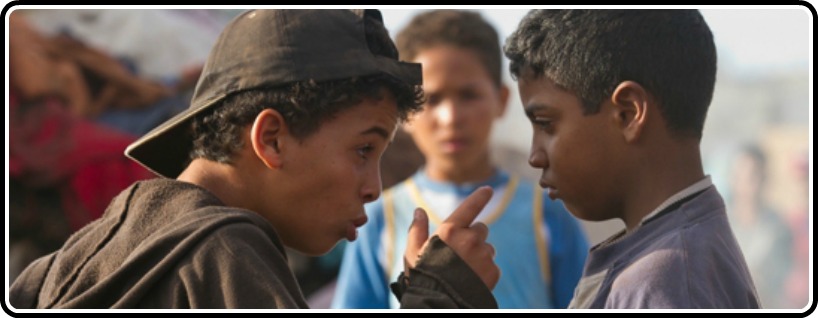The idea of the “presented by” credit is not a new thing in the film world. While names like Guillermo del Toro and, to a lesser extent, Eli Roth or Quentin Tarantino have relegated the idea of a beloved film name taking a small picture and giving it the ultimate co-sign to the world of genre cinema, this is an idea that has been seen throughout the history of film, almost since its inception. Now, it may not always be a qualitative sign, but when a name like Jonathan Demme gets involved with a film, it’s hard not to get a little (read: immensely) interested in the film he’s decided to attach his name to.
And thankfully, that very film lives more than up to any expectations one may have thanks to Demme’s involvement.
Entitled Horses Of God, the film comes to us proper from director Nabil Ayouch, and is a rather unforgettable drama. Spanning roughly a decade, the picture follows the story of three young men growing up on the outskirts of Casablanca. Ostensibly about a series of bombings that took place in Casablanca in 2003, the film starts a decade earlier, introducing us to these men in their earliest, most hopeful forms. With no interests above playing soccer and fawning over the opposite sex, we then see their lives as they go about them in the slum of Sidi Moumen. The youngest of the bunch, Nabil, is often called names and picked on but thankfully has the tough-willed Yachine to fight his battles. Yachine’s older brother is also close to the group, as he tries his best to defend both his younger brother and his meek best buddy. However, following a series of events including the sexual assault of Nabil by Yachine’s brother Hamid, their lives are completely turned upside down and instead of being a look directly at these horrible terrorist attacks that took 45 lives in Casablanca that day, we become privy to a truly haunting look at the journey that got these men there.
This is not director Ayouch’s first cinematic battle with these horrible events. Released the same year as these events took place, Ayouch bowed a deeply moving ten minute short documentary entitled To Not Forget, that looked at these events through the eyes of the families of those who lost their lives. However, this is entirely different beast, and an entirely different yet equally devastating look at this event. Ayouch’s direction here is the film’s greatest star. Ever evolving like the characters it follows, Ayouch’s camera begins its journey as youthful and expressive as the youngsters he introduces us to, but as time spans, hearts and hopes harden and the world becomes more bleak, the direction becomes far less expressive, instead opting for a brooding neo-realist aesthetic very much typical of this type of character study. The photography here is absolutely breathtaking, and while the flights of cinematic fancy are few and far between, the moments where Ayouch allows his camera to hit with a bit more bombast, the film really comes alive. At its core a truly unflinching character study, this year-spanning drama is a new and fresh-feeling take on a subject that hardly ever humanizes its central characters this potently and purely.
Thankfully, the performances help out just about as easily. Led by Abdelhakim Rachi as Yachine, the film’s three central performances are truly unforgettable. There is a pure vitality to Rachi’s performance, both hinting at the hope and life that he once had only to see it snuffed out with the introduction of the ever growing rash of militant Islam in his home country following September 11, 2001, really turning this performance into one of the better, and more underrated of the year so far. He’s opposite Hamza Souidek as Nabil and Abdelilah Rachid as Hamid, both of whom really add a great deal of depth to this rather lengthy character study.
Arguably the film greatest flaw, the film does have a slower pace to it, and while the final act feels a tad rushed, the film’s avoidance of any of the real aftermath of the events is refreshing. Instead focusing entirely on the journey these men take from hopeful youths to entirely committed suicide bombers in the film’s final scene, Horses Of God is a beautifully human account of a truly horrible event in African history.
Overall, while the film may be a tad long in the tooth, during a season that will see so many faceless lives lost in various Hollywood blockbusters, for a film to so passionately care about the life of men we only see here stateside as pure manifestations of evil is truly breathtaking. A wonderfully crafted character study that itself evolves aesthetically as the characters do narratively, Horses Of God is not a film to be missed. Thankfully, with the help of Jonathan Demme, it doesn’t have to be.




![Bergman Island (The Criterion Collection) [Blu-ray]](https://criterioncast.com/wp-content/uploads/2022/11/bergman-island-the-criterion-collection-blu-ray-400x496.jpg)
![This Is Not a Burial, It’s a Resurrection (The Criterion Collection) [Blu-ray]](https://criterioncast.com/wp-content/uploads/2022/11/this-is-not-a-burial-its-a-resurrection-the-criterion-collection-blu-ray-400x496.jpg)
![Lars von Trier's Europe Trilogy (The Criterion Collection) [The Element of Crime/Epidemic/Europa] [Blu-ray]](https://criterioncast.com/wp-content/uploads/2022/11/lars-von-triers-europe-trilogy-the-criterion-collection-the-element-of-400x496.jpg)
![Imitation of Life (The Criterion Collection) [Blu-ray]](https://criterioncast.com/wp-content/uploads/2022/11/imitation-of-life-the-criterion-collection-blu-ray-400x496.jpg)
![The Adventures of Baron Munchausen (The Criterion Collection) [4K UHD]](https://criterioncast.com/wp-content/uploads/2022/11/the-adventures-of-baron-munchausen-the-criterion-collection-4k-uhd-400x496.jpg)
![Cooley High [Criterion Collection] [Blu-ray] [1975]](https://criterioncast.com/wp-content/uploads/2022/11/cooley-high-criterion-collection-blu-ray-1975-400x496.jpg)